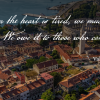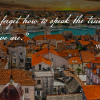
Published: September 15, 2001
View the Original Newsletter: Iskra-91.pdf
About This Issue
Iskra No. 91 was released just days after the September 11 attacks in the United States, and while the tragedy is not directly mentioned, the issue carries a tone of unease and moral reckoning. The editor, Valentina Krčmar, uses this edition to reflect on unity, responsibility, and the moral strength of Croatians both at home and abroad.
The issue blends strong political commentary, heartfelt community reflections, medical breakthroughs, and cultural pieces, all woven together by Valentina’s familiar call for conscience and national pride.
Editorial: “We Cannot Stand Still”
Valentina opens the issue with sorrow over the declining engagement of Croatians in the diaspora. She contrasts the vibrant Macedonian Independence Day celebrations in Mississauga—drawing more than 5,000 people—with the small Croatian turnout of only a few hundred.
“How is it that others can celebrate with such joy, while we, who fought so hard for independence, appear indifferent?”
She laments what she sees as apathy toward national pride and faith. Yet she closes with gratitude, remembering the late Nevenka Herak, whose kindness and spirit continue to inspire those who knew her.
Valentina calls on Croatians abroad to unite again through positive action—especially by supporting large families in Croatia through revived charitable efforts such as Akcija Treće Dijete (The Third Child Campaign).
“If our people do not help one another, who will? We must ensure that Croatian mothers feel supported, wanted, and proud to raise the next generation.”
Iskra-91
Commentary: “Mockery of Social Justice”
A powerful reprint from Glas Koncila challenges the Croatian government’s proposed “social reform,” which the author calls not reform but regression. The article argues that the government’s budget cuts to child benefits, maternity support, and veterans’ aid create “new injustices under the mask of fairness.”
“If the manger is empty, there will be no milk; yet the government keeps taking from those who already have nothing.”
The commentary calls for moral accountability among politicians and criticizes the growing gap between Croatia’s elite and its working families.
National News Highlights
The issue covers several key political and economic developments in mid-2001 Croatia:
-
Tourism Recovery: Minister Pave Župan-Rusković announces that tourist arrivals have finally matched pre-war 1990 levels.
-
Social Reform Laws: A set of eleven new bills is introduced, including changes to labor, health, and child-benefit laws.
-
Economic Policy: Debate erupts within the cabinet over foreign investment rules, exposing tensions between ministers Linić, Fižulić, and Crkvenac.
-
Vukovar Rebuilding: Local reports highlight the slow but steady reconstruction of the city, balancing hope with nostalgia for its lost character.
Motrišta: “The European Hypocrisy Toward Croatia”
A major feature by Luka Krilić, reprinted from Dom i Svijet, exposes what he calls the European Union’s political failure in the Balkans. He argues that Western powers have prioritized geopolitical balance over truth and justice.
“Europe did not defend the unarmed peoples of Slovenia, Croatia, or Bosnia. Instead, it insisted on the territorial integrity of Yugoslavia—protecting the aggressor, not the victim.”
Krilić accuses the EU of rewriting history to portray all sides as equally guilty and warns that the ultimate goal is to rehabilitate Serbia as a strategic partner.
“If Serbia were acknowledged as the aggressor, Europe would owe reparations. Thus, the truth must remain buried.”
He concludes with a passionate call for Croatians abroad to remain vigilant:
“Croatian emigration may once again be the answer to our homeland’s isolation. We must not wait for another invitation—we must act.”
Iskra-91
Health and Science
The health section presents remarkable advances from Croatian scientists:
-
Dr. Andrija Hebrang successfully performs a non-invasive carotid-artery procedure preventing stroke—a first for Croatia.
-
Professor Slobodan Vukičević and his team develop biotechnology capable of growing human cartilage and skin for transplant patients.
These breakthroughs are framed as signs that Croatia, despite limited resources, can still contribute to world-class medical innovation.
“The best medicine for despair is achievement born of persistence.”
Culture and Community Life
Iskra continues to celebrate the vitality of Croatian life in Canada:
-
Toronto: The Hrvatska Bratska Zajednica hosts a charity concert featuring Pitomačanka Folklore Ensemble from Croatia.
-
Norval: A special Mass honors newly ordained deacon Damir Stojić, marking a proud moment for the Croatian Franciscan Centre.
-
Hamilton and Mississauga: Local parishes and cultural groups report growing youth participation in language and dance programs.
Valentina highlights these events as proof that Croatian spirit endures wherever its people gather.
“Our strength is not in numbers but in love for who we are and where we come from.”
Recipes for the Season: “Apple Delights of the Old Country”
Valentina’s light-hearted cooking column, Za mlade kuharice (For Young Cooks), celebrates Canadian autumn with nostalgic apple-based desserts. Traditional recipes include apple foam, baked apples with apricot jam, Međimurje apple pie, and Snow White Apples.
Each recipe reflects her love of blending heritage with practicality—reminding readers that Croatian culture lives on in everyday family traditions.
Humor: “The Parenthood Test”
The humor section returns with “Test for Future Parents,” a tongue-in-cheek guide suggesting readers simulate parenthood by juggling Lego blocks, cooking disasters, and sleepless nights.
“If you can survive this test with a smile—you’re ready for children.”
Closing Thoughts
Valentina closes the issue on a hopeful yet urgent note:
“We cannot afford to fade into silence. Our homeland depends not only on those who stayed, but on those who remember.”
She ends with a signature appeal—one part challenge, one part blessing.
“Croatia is not a place we left; it is the promise we must keep.”




